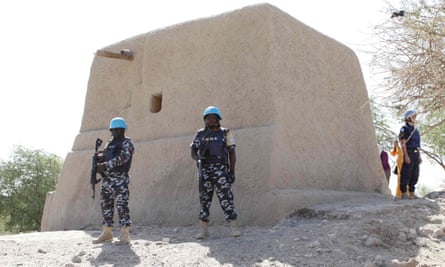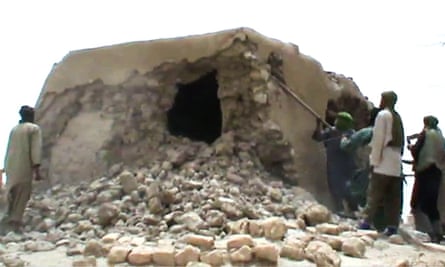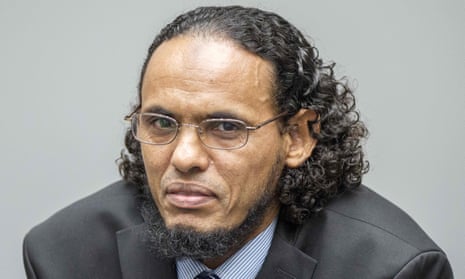An Islamic militant who helped destroy the fabled shrines of Timbuktu has been sentenced to nine years in prison in a groundbreaking case that prosecutors hope will deter other attacks on heritage sites around the world.
The trial was the first at the international criminal court to focus solely on cultural destruction as a war crime. It was also the first prosecution of an Islamic militant by the institution, which is based in The Hague.
Wearing a grey suit and blue tie, Ahmad al-Faqi al-Mahdi stood impassively in the dock as the presiding judge, Raul Cano Pangalangan read out the sentence.
The junior civil servant turned Islamic militant leader pleaded guilty last month to the single charge of “intentionally directing” attacks on nine of Timbuktu’s mausoleums and the centuries-old door of its Sidi Yahia mosque in 2012, when the Malian city was occupied by a coalition of militant groups.

The sentence was proportionate to the gravity of the offence, Pangalangan told Mahdi, and would have a “deterrent effect on others tempted to carry out similar acts in Mali or elsewhere”.
The shrines were “the heart of Mali’s cultural heritage [and] were of great importance to people of Timbuktu,” he said. “Their destruction does not just affect the direct victims of the crimes, but people throughout Mali and the international community.”
A slight, bespectacled man of about 40 with a mop of curly hair, Mahdi had asked for forgiveness from his people during a previous hearing, after videos were shown of him and other Islamist extremists attacking shrines with pickaxes and bulldozers.
According to local legend, the main door of the Sidi Yahia mosque would stay shut until the Last Judgment.
The “genuine remorse” Mahdi had shown, his apparent empathy for the victims of his crime and his initial reluctance to fall in with the plan to destroy the shrines, earned him a shorter sentence, Pangalangan said.
A coalition of Tuareg rebels and Islamic militant factions including al-Qaida in the Islamic Maghreb and a local group called Ansar Dine seized much of the northern part of Mali in mid-2012. They enforced a harsh version of sharia law in areas under their control, banning music, forcing women to wear the burqa and preventing girls from attending school, until a French-led military intervention repulsed them in January 2013.
Mahdi, from a village 62 miles (100km) outside Timbuktu, had been in neighbouring Algeria when the Islamic factions launched their offensive. He travelled to Timbuktu shortly after it fell to the extremists.
An acknowledged Islamic scholar, he had already been in contact with leaders of the Ansar Dine group and was appointed their religious adviser. He was also given command of the Hisba, a religious police charged with stamping out “evil practices” and encouraging “correct” behaviour.
The beliefs of the militants who took control in 2012 clashed with local custom.
Six centuries ago, Timbuktu was a place of great wealth and a renowned cultural centre. Its libraries held hundreds of thousands of precious medieval manuscripts and it was known as “the city of 333 saints”, after its many mausoleums of holy men.
These long-revered shrines were an immediate target for the hardliners, often from abroad, who followed an extreme variant of literalist doctrines practised in Middle Eastern countries such as Saudi Arabia.
Pangalangan said Mahdi had initially opposed militant leaders’ decision to destroy the shrines, saying they should spare them to avoid offending the local community. When his arguments were rejected, Mahdi gave orders to level them and oversaw the operation.
Apologising for his actions in earlier hearings, Mahdi said he had been overtaken by “evil spirits”, urged Muslims not to follow his example and said he wanted to seek the pardon of all his countrymen.
He was arrested in Niger and transferred to The Hague in September last year.
One of the most important shrines damaged in Timbuktu was recently opened to the public and worshippers after restoration.
El-Boukhari Ben Essayouti, who oversaw the reconstruction with Unesco assistance, said Mahdi’s trial was an important lesson.
The trial “has to be useful for something, showing to everyone that in the same way that we cannot kill another person with impunity, we cannot just destroy a world heritage site with impunity either,” he said.

The impact of the decision, however, may be more limited than campaigners and experts hope.
During the trial, Fatou Bensouda, the ICC’s chief prosecutor, compared the attacks in Timbuktu to Islamic State’s recent destruction of monuments in the Syrian city of Palmyra and the Taliban’s wrecking of the Bamiyan Buddha statues in Afghanistan in 2001.
It is unlikely that anyone from Iraq and Syria, where archaeological sites have been systematically damaged and ransacked for artifacts over recent years, will find themselves in the dock in The Hague any time soon.
Neither country is a signatory to the ICC’s founding Rome statute, meaning that without a mandate from the UN security council an ICC investigation into such crimes is not yet possible.
The successful prosecution of Mahdi will, however, be a boost to the ICC, which has been heavily criticised for its expense and patchy success in prosecution.
Since the ICC began operating in 2002, prosecutors have indicted 39 individuals, including the Ugandan rebel leader Joseph Kony; the Sudanese president, Omar al-Bashir; the Kenyan president, Uhuru Kenyatta; the former Libyan leader Muammar Gaddafi and the former Ivorian president Laurent Gbagbo.
The court, which has an annual budget of £130m, has handed down only three convictions.
Mahdi’s case will be less help in rebutting the frequent accusation of bias against African countries.
A peace agreement was signed in Mali last year, but fighting has continued, particularly in the lawless north, where extremists including Ansar Dine and bandits thrive.
Attacks are also becoming increasingly frequent in the central region of the country, close to its borders with Burkina Faso and Niger.
A soldier and a civilian were killed in Timbuktu in a suspected Islamic militant attack last weekend, and Ansar Dine was reported to have briefly held the town of Boni earlier this month.






